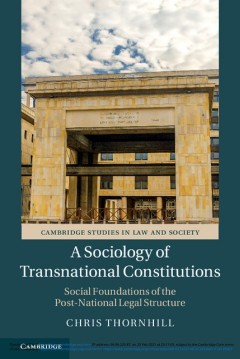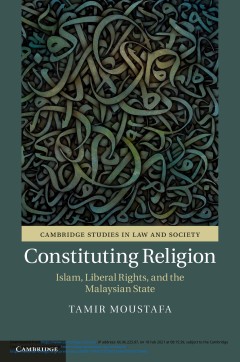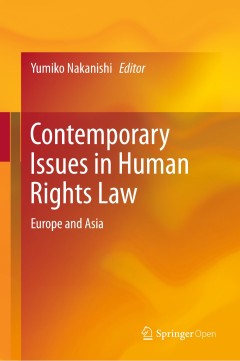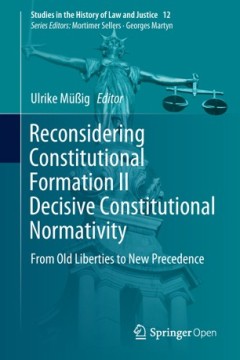Filter by

Constitutional challenges in the algorithmic society
Technologies have always led to turning points for social development. In the past, different technologies have opened the doors towards new phase of growth and change while influencing social values and principles. Algorithmic technologies fit within this framework. Although these technologies have positive effects for the entire society by increasing the capacity of individuals to exercise ri…
- Edition
- -
- ISBN/ISSN
- 9781108843126
- Collation
- x, 330 pages ; 24 cm
- Series Title
- -
- Call Number
- 342 MIC c

A sociology of transnational constitutions : social foundations of the post-n…
This volume focuses on the rise of transnational constitutional laws, primarily created by the interaction between national and international courts, and by the domestic transformation of international law. Through detailed analysis of patterns of institutional formation at key historical junctures in a number of national societies, it examines the social processes that have locked national sta…
- Edition
- -
- ISBN/ISSN
- 9781139833905
- Collation
- x, 520p. : ill.
- Series Title
- -
- Call Number
- 342.029 THO s

Constituting religion : Islam, liberal rights, and the Malaysian state
Most Muslim-majority countries have legal systems that enshrine both Islam and liberal rights. While not necessarily at odds, these dual commitments nonetheless provide legal and symbolic resources for activists to advance contending visions for their states and societies. Using the case study of Malaysia, Constituting Religion examines how these legal arrangements enable litigation and feed th…
- Edition
- -
- ISBN/ISSN
- 9781108539296
- Collation
- x, 187p. : ill.
- Series Title
- -
- Call Number
- 342.595085297 MOU c

Contemporary issues in human rights law : Europe and Asia
This book analyzes issues in human rights law from a variety of perspectives by eminent European and Asian professors of constitutional law, international public law, and European Union law. As a result, their contributions collected here illustrate the phenomenon of cross-fertilization not only in Europe (the EU and its member states and the Council of Europe), but also between Europe and …
- Edition
- -
- ISBN/ISSN
- 9789811061295
- Collation
- x, 219p. : ill.
- Series Title
- -
- Call Number
- 342.4085 CON c

Reconsidering constitutional formation II decisive constitutional normativity…
This second volume of ReConFort, published open access, addresses the decisive role of constitutional normativity, and focuses on discourses concerning the legal role of constitutional norms. Taken together with ReConFort I (National Sovereignty), it calls for an innovative reassessment of constitutional history drawing on key categories to convey the legal nature of the constitution itself (na…
- Edition
- -
- ISBN/ISSN
- 9783319730370
- Collation
- xii, 419p. : ill.
- Series Title
- -
- Call Number
- 340.1 REC r
 Computer Science, Information & General Works
Computer Science, Information & General Works  Philosophy & Psychology
Philosophy & Psychology  Religion
Religion  Social Sciences
Social Sciences  Language
Language  Pure Science
Pure Science  Applied Sciences
Applied Sciences  Art & Recreation
Art & Recreation  Literature
Literature  History & Geography
History & Geography